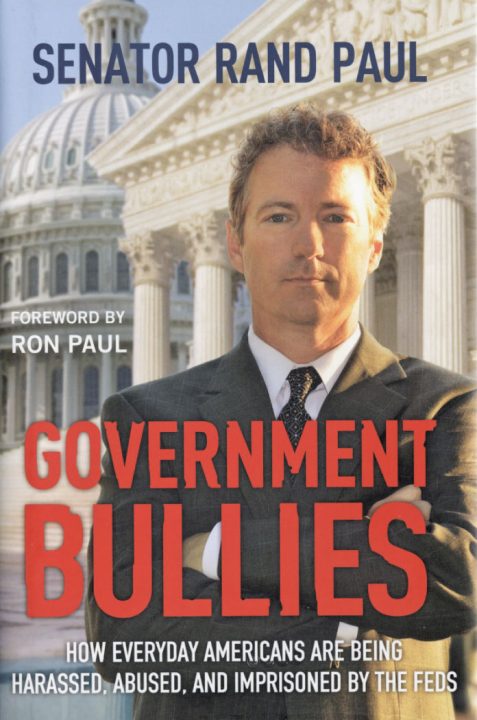
Government Bullies: How Everyday Americans Are Being Harassed, Abused, and Imprisoned by the Feds, by Senator Rand Paul, New York: Center Street Hatchett Book Group, 2012, 280 pages, hardcover.
The bad news is that after little more than a year and a half in federal office, U.S. Senator Rand Paul (R-Ky.) was able to fill a book full of instances he has come across of outrageous abuses of power by government officials lording it over people they allegedly serve. The good news is that there are a few people in Congress willing to stand up and sound the alarm over a once-free nation’s slide into the practices and policies of a police state. In a Congress that is shamefully servile before an overreaching and arrogant executive branch, Rand Paul and his father, U.S. Representative and two-time Republican presidential candidate Ron Paul (R-Texas), who wrote the foreword for his son’s book, stand out as men who take seriously their oath to uphold the Constitution.
Paul’s slender volume contains 21 chapters filled with one story after another of “government bullies” trampling on the rights of Americans in their homes and places of business. One paragraph sums up the tyranny of a government that has jumped the tracks of its legal and reasonable limits:
Most recently, this past August, Henry Juszkiewicz, the chairman and CEO of Gibson Guitar Corporation, had his company raided by armed federal agents. A half million dollars’ worth of Mr. Juszkiewicz’s property was seized, along with guitars and computer hard drives. His factory was shut down for a day, and his employees were ordered to go home. All this was done to him because he allegedly violated the Lacey Act, yet the Department of Justice has yet to file any formal charges against him.
No charges? It is disturbing when someone is brought to trial with inadequate or phony evidence or when one or more due process guarantees are violated in the course of bringing someone to trial and conviction. But if armed agents of the federal government can shut down someone’s business and take half a million dollars worth of property without even charging him with a crime, then you have to wonder if the government itself has not become the nation’s most dangerous criminal.
Gibson Guitar’s ordeal with the federal government began when a SWAT team from the Department of Homeland Security, made up of more than 30 agents armed with automatic weapons, descended on the Gibson factory in Nashville, Tennessee. The agents evacuated the factory, forcing out nearly 300 workers. They then seized hundreds of thousands of dollars worth of materials. The search warrant was sealed, leaving Juszkiewicz to wonder what his guitars had to do with homeland security.
The agents were, in fact, with U.S. Fish and Wildlife Service, now a bureau of DHS. They were apparently searching for evidence of violation of the Lacey Act, a 1900 law that bans trafficking in illegal animals, fish, and plants. Congress has amended it several times, most recently in 2008, adding heavy fines and jail sentences for importations that violate foreign laws. Gibson’s imports of woods from India and Madagascar allegedly violated laws of those countries that protected those raw materials.
“But if that is true, they should tell the governments of Madagascar and India,” Paul wrote. “Both countries have said in writing that Gibson has not broken any of their laws. In every shipment, Gibson had clearance from both foreign and U.S. customs, following all the rules and paying all the necessary tariffs. These foreign governments certify all of this. Our U.S. Customs confirms this to be true. But the U.S. government doesn’t recognize any of this and still proceeds with its vendetta against Gibson.”
Paul suggests the vendetta may be due, in whole or in part, to what he describes as “huge” donations to the Democratic Party by Gibson’s main competitor, Fender Musical Instrument Corporation. “The alternative,” he wrote, “is worse — that our government really is just this stupid.”
Paul also tells the story of David McNab, a citizen of Honduras, and three American business people, all of whom received multi-year prison sentences resulting from the shipment of undersized lobster tails from Honduras to Alabama in violation of regulations promulgated by the government of Honduras. Yet only about three percent of the lobster tails turned out to be less than the regulation 5.5 inches in length. Further, no size restriction had been signed into law by the president of Honduras, and that nation’s attorney general offered the opinion that the regulations at issue did not have the force of law.
Yet the investigation by the National Marine Fisheries Service, inspired by an anonymous tip, led to prison sentences of eight years each for McNab and two American businessmen who purchased and distributed lobster tails from him. An American businesswoman, also a McNab customer, received a two-year sentence. The only basis for finding the shipment illegal, Paul wrote, was that “it was packed in bags, not boxes. In effect, the defendants were convicted of smuggling because they packed lobster in clear plastic bags instead of opaque cardboard boxes.”
Paul has recounted story after story of Americans harassed by their government for building — or in some cases, simply moving dirt around — on their own property when that property includes what agents of the Environmental Protection Agency decided were “wetlands.” Wetlands “are simply whatever the EPA says they are, a definition that can change dramatically without rhyme or reason,” Paul wrote. “Even the Supreme Court criticized the existing wetlands laws as vague and impossible to comprehend.”
Mississippi developer Robert Lucas, his daughter, Robbie Wrigley, and his engineer, M.E. Thompson, were all sent to federal prison for conspiring to violate the Clean Waters Act. The “conspiracy” involved Lucas’ residential development of property “twelve miles inland from the coast, over two miles away from a running creek, and one hundred feet above sea level,” Paul wrote.
“By no reasonable definition — by no government definition — was this property in any way a wetland.” Yet the EPA managed to get convictions from a jury understandably hard pressed to understand wetland laws that Supreme Court justices have found incomprehensible.
Paul has recounted the derring-do of federal “milk police” descending upon Amish farmers and others selling raw milk to customers looking to buy it. Daniel Allgyer, his wife, and eight children were awakened at 5:00 one morning in an armed raid on their farm in Lancaster, Pennsylvania, conducted by two U.S. marshals and a state trooper. Allgyer was selling fresh raw milk to customers throughout the northeastern United States in violation of a 1987 Food and Drug Administration edict. The raid was the culmination of a year-long sting operation and led to an order from a federal judge that Allgyer cease selling the milk outside his own state. Since most of his customers were from outside Pennsylvania, he shut down his farm. “Putting Rainbow Acres Farm out of business was the FDA’s ultimate goal throughout this entire saga,” Paul wrote.
The Transportation Security Administration comes in for several pages of criticism for, in the words of a chapter title, “Touching and Squeezing America.” Paul has described his own run-in with the federal airport police when he refused to submit to a pat down, along with several other examples of unreasonable and, in some cases, indecent practices of the screeners. He has introduced legislation to privatize the passenger screening, believing that the airlines and their contractors would be less likely to harass six-year-olds and their grandmothers and more likely to check out the frequent flyer to Yemen and the Nigerian traveler who somehow managed to board with expired boarding passes and no identification under the TSA’s watch.
Paul also noted an interesting fact about those “nude body” scanners now used in airports throughout the country. In 2005, the first orders for the scanners were placed by the Department of Homeland Security under then-Secretary Michael Chertoff. After leaving DHS, Chertoff became a lobbyist for Rapiscan, the manufacturer of the scanners. After the “underwear bomber” incident on Christmas Day, 2009, Chertoff, as former head of the DHS, showed up in numerous TV interviews, offering his expert opinion on the need for the scanners.
Paul’s Air Travelers’ Bill of Rights would allow airports to opt out of the TSA regime in favor of a private screening contract and create a separate screening process for pre-cleared frequent fliers. It would guarantee the right of travelers who fail an imaging or metal detector test to be re-screened rather than subjected to an automatic pat down. It would eliminate pat-downs for children age 12 and under, guarantee the right of parents to remain with their children during screenings, and recognize a traveler’s right to contact an attorney when detained by airport authorities.
Paul has offered other bills and amendments to rein in an arrogant and overbearing government that recognizes virtually no limits its vast array of powers unrecognized by our Constitution and unimagined by its Founders. Not surprisingly, given the current makeup of Congress, they have not yet become law. But the senator vows to continue the effort.
“I will keep fighting to protect the freedoms that belong to all Americans citizens as our birthright,” he promises, ending his book with an invitation to each reader. “I hope you’ll join me.”



